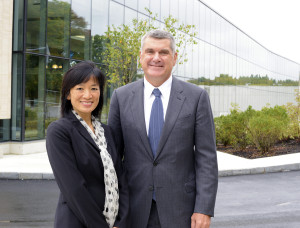Memorial Sloan Kettering Cancer Center campus to open
It was a seven-hour commitment every time Kelley Hebert had a scheduled treatment for breast cancer at Memorial Sloan Kettering Cancer Center in Manhattan.
During the four-month period in which she underwent chemotherapy, Hebert, who lives in New Rochelle, had to block out 75 minutes in driving time each way, recruiting her husband or friends to help her make the trip into the city.
“It was a little bit of a logistical challenge, sometimes, to manage all of it,” Hebert said.

Now, cancer patients at Memorial Sloan Kettering who live in Westchester County, the lower Hudson Valley and western Connecticut will only have to travel to the hospital”™s new 114,000-square-foot West Harrison campus for treatment. The $143 million campus at 500 Westchester Ave., which will open for patients Oct. 6, is expected to raise the standard of cancer care in Westchester County, according to MSK officials, as well as provide greater access to new treatments.
“Approximately 13 percent of our patients reside in the Hudson Valley and western Connecticut area,” said Richard Barakat, the deputy physician-in-chief for the Regional Care Network and MSK Cancer Alliance at Memorial Sloan Kettering, at an opening celebration on Oct. 1. “We are aware that there is an acute need to provide access to a standard of care and clinical trials that is available in the city to patients in the suburbs.”
In addition to opening the new campus, Memorial Sloan Kettering announced a partnership with Mount Kisco Medical Group to provide non-cancer treatment services, including cardiology, gastroenterology, gynecology, infectious disease and internal medicine to MSK”™s patients.
“We could not be more pleased to partner with Memorial Sloan Kettering to provide them with supporting clinical services in their brand new, state of the art facility,” said Scott D. Hayworth, the president and CEO of Mount Kisco Medical Group.
Patients at the new West Harrison campus will be able to receive the same care they would get at Memorial Sloan Kettering”™s facility on the east side of Manhattan, including access to new treatments and procedures that are still being tested, officials said.
“Among the things we want to do more of is ensure patients have access to leading cancer care,” said Craig Thompson, the president and CEO of Memorial Sloan Kettering Cancer Center. “Often the latest advances are only available through clinical trials. Memorial Sloan Kettering West Harrison will make these trials and their treatments available here.”
Recent developments in cancer care have enabled it to be given in an outpatient setting in the community, making a facility like the West Harrison campus a possibility, according to Jose Baselga, MSK”™s physician-in-chief and chief medical officer.
“Our employees and physicians don”™t take what we do as a job. People here are devoted to what they do. They”™re proud to be serving patients in the cause of eradicating cancer as a leading cause of death,” Baselga said.
Hebert, now a breast cancer survivor, said it was important to her to have all of her doctors and treatments through the same organization. Patients with a similar desire will now have an easier time getting that need met, all the while being closer to their family and friends during treatment.
“It would have been easier for my son, who was in high school at the time,” Hebert said. “He was never able to visit me during any of the treatment. I think he was curious about all of it and would have been able to get a view and a window into the whole process if it had been here.”
Having that support network is most important, Hebert said, as a patient gets toward the end of a successful treatment cycle.
“When you”™re in the treatment phase and you know you”™re through the worst of it, and it”™s just about the process at that point and completing it, then it”™s great for the family and the patient to be able share the experience.”